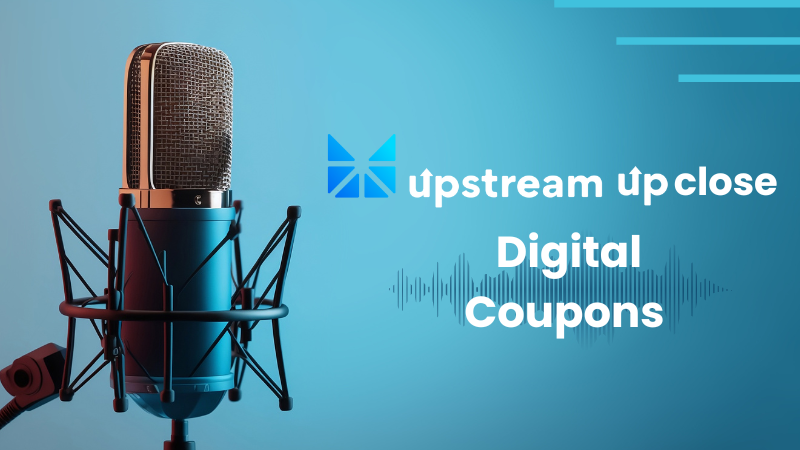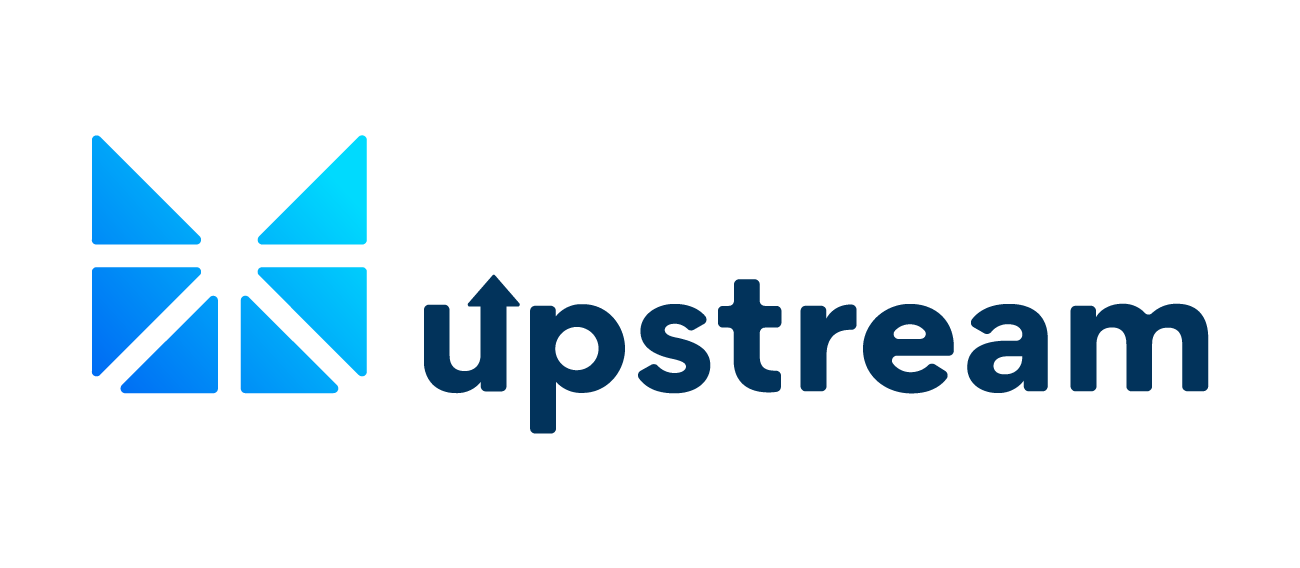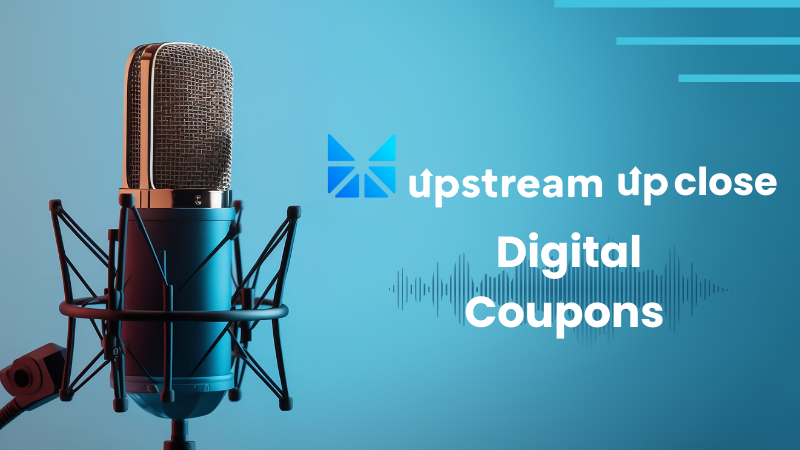Exploring Upstream’s digital coupon program that aims to turn shareholders into customers and customers into shareholders.

by Fernanda De La Torre
This week, the Upstream team published the sixth episode of their new Twitter Spaces series, ‘Upstream Up Close’, featuring 10–15 minute conversations about NFTs, blockchain, and trading on Upstream. This sixth episode touches on Upstream’s Digital Coupon NFTs, what they are, how companies can benefit from them, and the digital coupons Upstream has launched thus far.
Listen HERE to Upstream Up Close: Digital Coupons
Imagine a world where shareholders become customers and customers become shareholders, all thanks to the power of non-fungible tokens (NFTs). Upstream is at the forefront of this revolution, introducing digital coupons in the form of NFTs to bridge the gap between companies and their stakeholders.
What are digital coupons?
Digital coupons, represented as ERC721 tokens, are at the heart of this transformation. An Upstream digital coupon is an NFT claimable and redeemable for physical merchandise, products, discounts, or services from an issuer. Digital coupons are not securities. They offer no ownership in the Company, dividends or profits and do not fall under the Howey Test**. They are similar in nature to traditional coupons, but just digital in nature. They are issued as ERC721 tokens, which are a standard for representing ownership of NFTs, where each token has a unique identifier. All shareholders of a set record date are entitled to claim one digital coupon. Upon redemption, the Upstream holder will be issued a unique, one-time redemption code to be provided to the issuer to claim their reward.
A win-win for shareholders and companies
But what happens once a shareholder claims their digital coupon? The possibilities are intriguing. Shareholders can either redeem the coupon to experience the company’s products firsthand or trade it on the Upstream marketplace. This not only raises awareness of the company among a global audience but also rewards shareholders for their support.
Upstream’s digital coupons offer a range of benefits for issuers. First and foremost, they open doors for increased revenue by re-engaging shareholders and traders with the company’s products or services. It’s a symbiotic relationship where both parties gain — shareholders connect with the company, and the company gains exposure.
The digital coupon process on Upstream
So, how does this program work at a high level? It all starts with the company’s vision for the digital coupon and what initiative or product they want to drive attention to. Upstream’s team assists in completing the digital coupon order form and ensures the media aligns with the plan. The company then adds the digital coupon details to their investor relations page, announces the launch date, and supports fulfillment after the launch.
Claiming and redeeming the digital coupons are made seamless. Shareholders complete the KYC identification process in the Upstream app before the launch day. On launch day, eligible shareholders claim their coupons by entering a code in the app. Once verified, these coupons can be redeemed or sold on the Upstream marketplace.
The possibilities are limitless when it comes to tailoring these digital coupons.
Upstream has successfully launch various digital coupons for our dual listing issuers. One of the digital coupons unlocked an exclusive gift package of company products for all its shareholders valued at over $179. The other digital coupon was launched for Edtech company, Genius Group, which gave shareholders credits for educational videos.
When we work with issuers, we recommend a comprehensive marketing plan to go with the digital coupon campaign using whichever mediums are available to the issuer to drive buzz around their entry into Web3 shareholder engagement. This can include press releases, social media posts, email campaigns, and more to make shareholders aware of the reward available to them.
The more buzz the better, we’ve also had great success using Discord to support the campaigns. Issuers can use their own or Upstream can create a specific channel for the campaign and invite Issuer reps on to chat with shareholders in real time about the campaign.
Conclusion
It’s clear that Upstream’s digital coupons are changing the landscape of shareholder engagement. NFTs are no longer confined to art; they’re shaping the future of business practices. Through these tokens, companies and investors are creating a new chapter in their relationship — one built on value, interaction, and empowerment.
Disclaimers
This communication shall not constitute an offer to sell securities or the solicitation of an offer to buy securities in any jurisdiction where such offer or solicitation is not permitted.
NFTs have no royalties, equity ownership, or dividends. NFTs are for utility, collection, redemption, or display purposes only. Anyone may buy and sell NFTs on Upstream.
U.S. or Canadian-based citizens or permanent residents may only deposit, buy, or sell securities on Upstream after being introduced by a licensed broker-dealer. Note that U.S. or Canadian-based investors include those U.S. or Canadian citizens who may be domiciled overseas. All orders for sale are non-solicited by Upstream and a user’s decision to trade securities must be based on their own investment judgement. Anyone may buy and sell NFTs on Upstream.
** The Howey Test SEC.gov | Framework for “Investment Contract” Analysis of Digital Assets
Upstream is a MERJ Exchange market. MERJ Exchange is a licensed Securities Exchange, an affiliate of the World Federation of Exchanges, a National Numbering Agency and member of ANNA. MERJ is regulated in the Seychelles by the Financial Services Authority Seychelles, https://fsaseychelles.sc/ an associate member of the International Association of Securities Commissions (IOSCO). MERJ supports global issuers of traditional and digital securities through the entire asset life cycle from issuance to trading, clearing, settlement, and registry. It operates a fair and transparent marketplace in line with international best practices and principles of operations of financial markets. Upstream does not endorse or recommend any public or private securities bought or sold on its app. Upstream does not offer investment advice or recommendations of any kind. All services offered by Upstream are intended for self-directed clients who make their own investment decisions without aid or assistance from Upstream. All customers are subject to the rules and regulations of their jurisdiction. By accessing the site or app, you agreed to be bound by its terms of use and privacy policy. Company and security listings on Upstream are only suitable for investors who are familiar with and willing to accept the high risk associated with speculative investments, often in early and development stage companies. There can be no assurance the valuation of any particular company’s securities is accurate or in agreement with the market or industry comparative valuations. Investors must be able to afford market volatility and afford the loss of their investment. Companies listed on Upstream are subject to significant ongoing corporate obligations including, but not limited to disclosure, filings, and notification requirements, as well as compliance with applicable quantitative and qualitative listing standards.
Forward-Looking Statements
This communication contains “forward-looking statements.” Such statements may be preceded by the words “intends,” “may,” “will,” “plans,” “expects,” “anticipates,” “projects,” “predicts,” “estimates,” “aims,” “believes,” “hopes,” “potential,” or similar words. Forward-looking statements are not guarantees of future performance, are based on certain assumptions, and are subject to various known and unknown risks and uncertainties, many of which are beyond the Company’s control, and cannot be predicted or quantified, and, consequently, actual results may differ materially from those expressed or implied by such forward-looking statements. Such risks and uncertainties include, without limitation, risks and uncertainties associated with (i) difficulties in obtaining financing on commercially reasonable terms; (ii) changes in the size and nature of our competition; (iii) loss of one or more key executives or brand ambassadors; and (iv) changes in legal or regulatory requirements in the markets in which we operate. The Company assumes no obligation to publicly update or revise its forward-looking statements as a result of new information, future events or otherwise.

